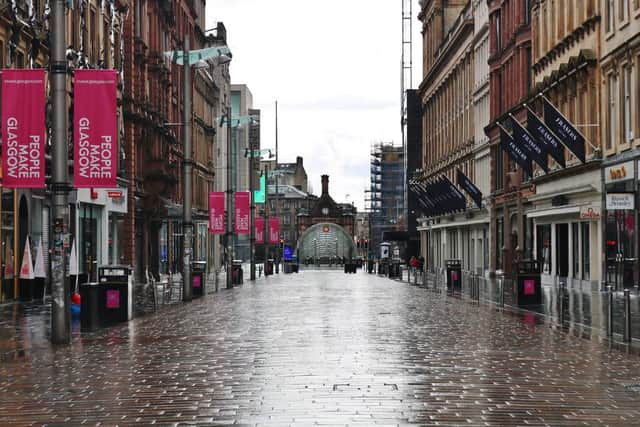Covid in Scotland: Glasgow to remain in Level 3 restrictions as Moray moves down to Level 2
and live on Freeview channel 276
Scotland First Minister Nicola Sturgeon has announced that the Moray area will move down to Level 2 restrictions from midnight on Friday (21 May), but Glasgow will remain in Level 3 due to rising Covid cases.
Earlier this week, with the exception of Glasgow and Moray, mainland Scotland moved to level two, with most of the islands moving to level one.
Advertisement
Hide AdAdvertisement
Hide AdMoray had been kept in level three over concerns about its infection rate, with surge testing brought in to help tackle the spread of Covid cases.


However, according to official statistics published on Thursday (20 May), the weekly case rate in Moray had fallen to 36.5 per 100,000.
‘Go in earlier and harder and you can see the light in a week or two weeks getting out of this’
East Renfrewshire will also stay in Level 2 although the First Minister said the situation there would remain under “close review”.
The rate of cases in East Renfrewshire, which shares a council border with Glasgow, rose to 118.3 per 100,000 people in the seven days to 17 May, while Glasgow’s rate was 112.1.
Advertisement
Hide AdAdvertisement
Hide AdHowever, Professor Devi Sridhar, of the University of Edinburgh, said earlier that moving East Renfrewshire back up to Level 3 of Covid restrictions could help get the surge in cases under control quicker.
The public health expert told BBC Radio Scotland’s Good Morning Scotland programme: “While it is painful to move backwards we’ve seen for example in Moray that actually that early action in holding it brought the numbers down so it can be released earlier.
“We’ve learned throughout this in every country is you move early, you move hard, you move fast and then once you have the problem under control and you get those numbers down you can release quicker.”
“The thing I would say to the people who are living there is that actually in some ways the crisis and the problem that you’re facing in your community might be over faster, go in earlier and harder and you can see the light in a week or two weeks getting out of this,” Prof Sridhar added.
Advertisement
Hide AdAdvertisement
Hide Ad“Whereas if they delay action for a week or two it might be that you’re stuck in this for a month going into the summer.”
“That’s the really tough trade-off for leaderships and political decision-making which I don’t envy at all, it’s when is that tipping point when you say actually we need to move early – even when it feels too early that’s probably when you need to be moving.”